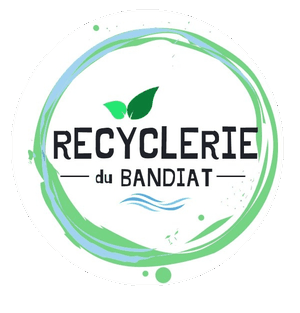We currently have a hangar of approximately 450m2, of which 250 m2 are dedicated to sales, at 14 chemin de la manufacture, Zone Industrielle de Goulat, 24300 Nontron.
We are open Fridays and Saturdays from 10 a.m. to 6 p.m. from June 1 to August 31, 2024.
We will be closed for holidays from August 11 to 29.
For any information regarding timetable changes, exceptional closures and holidays, clearance sales, events and recycling activities, please contact our Facebook page.
How do items arrive in store?
All objects are sorted by category or department upon their arrival, then are sorted by the section valorists and volunteers of the association, who decide to put them on sale… or not, depending on its condition, its composition, its usefulness and its durability.
- If the object is retained (in the majority of cases), it can be cleaned or repaired if necessary. It will then be stored in the corresponding department, taking care to organize the necessary space, its classification, its visibility.
- In some cases, very old or very new items require a price search to estimate their value, which will always be lower than the price ranges found online. These objects constitute our “nuggets” where prices are displayed.
- If the object is not retained (damaged, too obsolete) it will be dismantled and sorted according to its recycling channel. Recycling waste is sorted by material and is sent either to the waste union, or to a private sector or a dedicated eco-organization.
What shelving can we find in our solidarity store?
- Furniture: antique and modern furniture, bedding
- Household appliances: large and small valued appliances sold under warranty
- Textiles: children’s and adult clothing, household linen, furnishing fabrics, shoes, luggage, haberdashery, blankets, rugs, cushions and pillows, etc.
- Tableware: porcelain, glass, wood, metal, plastic, etc.
- Culture: Classified books, for children and adults, comics, DVDs, CDs, Vinyls…
- Stationery: office equipment, binders, pencils, creative hobbies, photo albums, etc.
- Games, toys: board, construction, imitation, outdoor…
- Sporting goods: rollerblades, swimming, judo, horse riding, bodybuilding…
- DIY items, gardening and materials: few tools and hardware, but various DIY items, lots of seedling trays and sanitary parts (toilets, washbasins, sinks, etc.)
- Decoration: trinkets, candles, framing, etc.
- Jewelry: necklaces, rings, bracelets, watches, brooches…
- Childcare: strollers, car seats, baby beds, potties, bathtubs, etc.
- Hygiene articles and paramedical accessories: walkers, crutches, splints, hygienic protection, care and hairdressing equipment, etc.
- Lighting: with or without electricity, lampshades, lamps…
What you won’t find (yet):
- Bicycles: lack of space and reference in this area
- Thermal tools: except in very exceptional cases not requiring repair
- Material library: in project
Prices and Free Price
What is done in recycling:
Certain valuable objects, furniture and household appliances (with us: more than 30E in their original value) are estimated and priced at around a third of their new value, and half of the flea market price found online. The largest in the store (around 80%) displays prices from 0.50 to 10 euros.
What’s happening with us:
We have chosen to experiment and promote free pricing as an economic model for the sale of objects whose estimated value is less than 15 euros. We leave the recycling user free to determine their purchase price, for several reasons:
- the fair price: the user pays what seems fair to them given the condition and value of the object. He establishes his price with his own scale of values (prices observed second-hand). He doesn’t need to bargain.
- accountability: the user is free to pay according to their economic means and their needs. He takes responsibility, both for his budget and for his real needs. It develops responsible consumption.
- conscience: the user pays a financial contribution to the association for the work it provides, which contributes to current operating costs (human and material resources).
- trust: to buy tested, repaired and/or guaranteed equipment, to be well received and heard in their requests (for the user),
- the need to reuse large volumes: we must make room for arrivals!
